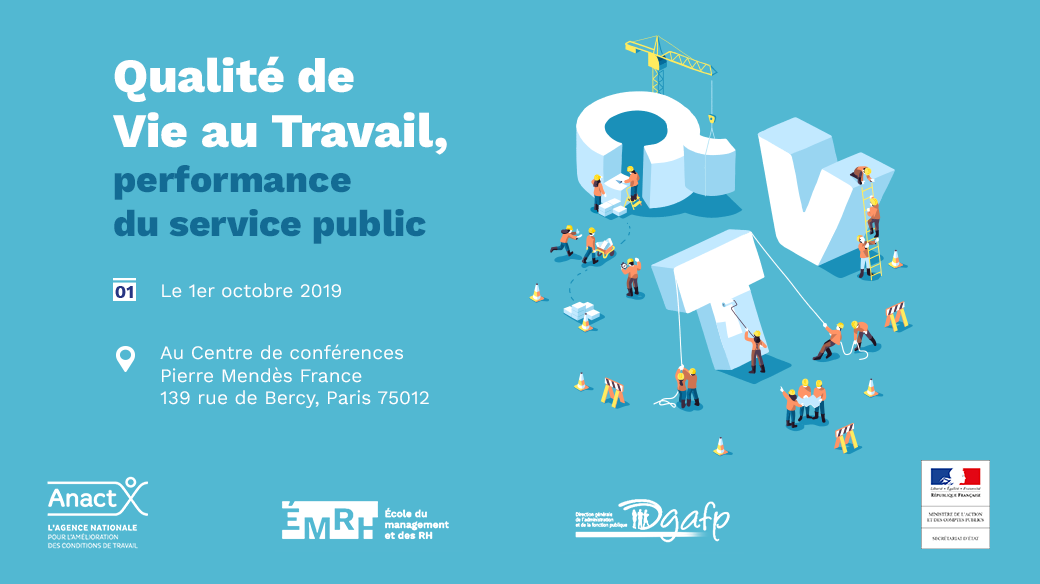|
If you are having trouble viewing this email, open it with your internet browser,
download the PDF version
or contact us.
|
 |
| #17 - September 2019 |
| PDF version - Manage your subscription - Search - Archives |

|
|
vision RH is a newsletter published by the French Directorate General for Administration and the Civil Service (DGAFP). It draws on information sources and reports issued by public administrations, the private sector, international organisations and the press, in several different languages. It aims to provide a broad view of current human resources and civil service initiatives.
|
|

|

|
| Quality of working life as a yardstick for high-performing government serving the public | |||||
|
Both the effectiveness of organisational structures and a healthier working environment can be achieved by providing civil servants with a high standard of support to boost their personal well-being and productivity. As they are increasingly confronted with issues regarding appeal and change, national governments frequently conduct satisfaction surveys1 with a number also rolling out country-wide strategies. Malta has elected to make the quality of working life policy part of its overall standard of service approach. The government’s HR staff now belong to a new People and Standards Division, with one of its four directorates (People Support & Wellbeing) being tasked with this cohesion work. The directorate provides top level psychological support and confidential counselling for staff with work-life balance concerns. The entire management team is also trained by a group of psychologists and social workers. In the long term, cutting red tape and streamlining procedures for users will only have true impact if the onus is also placed on the overriding need to change employees’ working conditions. This is the fresh strategy introduced in Denmark which is the world’s top “quality of life” nation. In parallel with the expansion of digital technologies, the Danish government’s Agency for Modernisation focuses on protecting human capital. This takes the form of huge investments in both training and infrastructure to make everyday life easier which were negotiated during the most-recent round of collective bargaining (OK18 collective agreements). Prevention measures are bolstered by dispensing advice on health in the workplace using didactic self-assessment resources and by providing customised support services, if needed. The Austrian government offers its employees an online training module called “Ich - in Arbeit” (Me – work in progress) and access to counselling and support under the “fit2work” programme from professionals who have been specially trained to make diagnoses and help staff. The programme also offers problem-resolution mediation services. Stability, which is crucial for both personal balance and inter-generational knowledge transfer, needs to be safeguarded against a backdrop of longer working lives and career paths which may change by choice or otherwise. All Dutch civil servants have access to the government’s “sustainable employability” programme. Employees, management and HR cooperate through workshops to come up with tangible solutions for changing work organisation and altering mindsets. The matter of funding is obviously a recurrent theme. In 2018, an inaugural project to improve occupational well-being financed by Social Impact Bonds was initiated in Finland and the goal of reducing sick leave days has been achieved. Why not make the civil service the best place to work in the country? The UK set itself this bold goal when it unveiled one of the pillars of the vision of a Brilliant Civil Service under the strapline “A great place to work” two years ago. By comparison with other employment sectors, government departments are being directed to improve performance levels and there have already been positive outcomes. Although nine out of ten managers acknowledge that “companies must take action to protect employees’ health”, a number of recent studies2 have revealed continued divergences in France in establishing what is actually being done to boost occupational well-being. |
|||||
|
|||||
|
|
|||||

|
|||||

|

|

|
| Monitoring rollout of the French Civil Service Transformation Act | |||||
|
The Isère management centre (local civil service) has designed an online chronological timeline for monitoring the gradual implementation of the Civil Service Transformation Act which was adopted on 6 August 2019. This detailed instructional resource presents the Act’s 94 articles in six principal categories. Each article is paired with a description of the changes brought about by the new legislation. |
|||||
|
|||||
|
|
|||||

|
|||||
| New classification for Spanish government contract staff | |||||
|
As the number of contract staff (personal laboral) is increasing in the General Government Administration (AGE), their circumstances are set to improve through a narrowing of the gap with their established civil servant colleagues. The new collective bargaining agreement overhauls the classification of positions by giving greater weight to the degrees and qualifications required for holding these posts. |
|||||
|
|||||
|
|
|||||

|
|||||
| An “employer branding” toolkit for public sector employment in Sweden | |||||
|
As part of its “Jobba statligt” (working for the government) initiative, the HRD offers public employers arrangements to help highlight careers and professions through a common approach which nevertheless leaves room for customisation to cater for specific local or professional requirements. The toolkit is made up of communication kits, graphic media and presentation videos. « With this toolkit, we want to provide you with inspiration for your role as a public employer »
|
|||||
|
|||||
|
|
|||||

|
|||||

|

|
| Outreach programme for careers with an international organisation (OSCE) | |||||
|
The Vienna-based Organization for Security and Co-operation in Europe (OSCE) offers monthly webinars to showcase its assignments and areas of expertise. The aim is to attract candidates by offering guidance on interview and application preparation strategies. The most-recent webinar was specifically aimed at French nationals who are under-represented in the organization. |
|||||
|
|||||
|
|
|||||

|
|||||
| Hospital and local civil services training cooperation | |||||
|
A three-year agreement executed by the National Association for the Ongoing Training of Hospital Staff (ANFH) and the National Local Civil Service Centre (CNFPT) aims to foster cooperation. It has three arms: knowing and leveraging the current situation, implementing joint initiatives, promoting instructional innovation and support for HR policies. This mutually-beneficial momentum will be materialised by exchanging know-how and feedback, sharing data and pooling resources. |
|||||
|
|||||
|
|
|||||

|
|||||
| Leroy Merlin successfully wagers on hiring without CVs | |||||
|
Potential applicants can be more rapidly contacted by adjusting recruitment policies to reflect both the opportunities provided by digital technology and changing expectations and lifestyles. This mass retail trade name now has a video interview preselection process. The HRD claims that almost a third of new staff were not recruited simply on the basis of their CVs./p> « Accepting a video interview is a very powerful way to measure motivation and not lose good candidates »
|
|||||
|
|||||
|
|
|||||

|
|||||

|

|
| The appeal of IT careers in the German federal civil service | |||||
|
In a bid to address problems with recruiting for a number of IT positions, the German government is looking to bolster compensation packages by bringing them more into line with those of the private sector. To this end, a bonus, which is capped at 30% of the monthly salary, may be paid for a maximum of 48 months. In return, applicants undertake to work for the department that hires them during this period. |
|||||
|
|||||
|
|
|||||

|
|||||
| Ireland starts a recruitment drive for HR administrative officers | |||||
|
With an eye to making its managers more professional, the government has introduced a new HR stream. Applicants are expected to have a primary honours degree and training or initial experience in HRM. Once hired, they will support Department HR teams in achieving key organisational objectives through the successful implementation of local HR strategies. |
|||||
|
|||||
|
|
|||||

|
|||||
| The “Top Skills” initiative for more female managers in the Belgian federal civil service | |||||
|
An initiative has been unveiled to encourage women to apply for positions in the senior civil service where they remain under-represented at less than 30%. The support programme comprises simulated interviews to better identify strengths and areas for improvement, together with more customised development advice and training and coaching offerings. « Participants feel better equipped to apply and see more opportunities for career development »
|
|||||
|
|||||
|
|
|||||

|
|||||

|

|
| US Federal workforce gets support for relocation | |||||
|
A number of departments are set to move from Washington to other cities in the country. The first two moves concern the Agriculture and Interior Departments. The latter is offering its employees (on a voluntary basis) an incentive package including a relocation bonus representing 25% of their base salaries and a “permanent change of station” allowance, which will let them either accept 60 days of temporary housing and related living expenses or take an agency-funded house-hunting trip to their new location before reporting there. |
|||||
|
|||||
|
|
|||||

|
|||||
| Bolstering equal opportunities in the Italian public sector | |||||
|
A directive to foster equal opportunities in the public sector sets out the tangible measures that need to be taken to eliminate all forms of discrimination surrounding hiring, training, eligibility for promotion and work organisation. “Unique Guarantee Committees”, which are mixed joint bodies that previously worked in an advisory capacity, will monitor and assess implementation of the measures. |
|||||
|
|||||
|
|
|||||

|
|||||
| The “3rd Line” programme for work-life balance in Portugal | |||||
|
The Portuguese government is prioritising work-life balance. It has initiated the “3rd Line” programme which is a set of measures with one of its four arms being devoted to the public sector. Amongst its flagship initiatives are the introduction of a mandatory training module for all managers to raise awareness of best practices, as well as polling of employees and regular appraisals. « We will set goals for leaders that include the implementation of practices that help balance work and private time for staff »
|
|||||
|
|||||
|
|
|||||

|
|||||

|

|
| SNCF has a special academy to help HR stakeholders become more professional | |||||
|
The French railway group boasts an HR department with over 7,000 employees, who represent almost 2.7% of its workforce. In view of the number of annual hires (4,400 in 20181), the fact that there are over 150 different occupations and, most importantly, the sweeping changes faced by the company, support and training within the department is a major issue. The HR academy was designed to unify the department and is geared towards building a common culture and helping the stakeholders become more professional. It offers customised training courses for the HR department’s different positions, irrespective of where they are located in the group’s various entities. A two-pronged “Excellence Responsable RH” course has been introduced to enable HR to hone its position and learn occupation-related technical skills so that it can forge partnerships with managers and help with the overall development approach by being truly proactive. The academy is staffed by fifteen full-time trainers who are constantly putting forward innovative measures such as pairing off with the HR departments of other major businesses and SMEs to compare in-house practices with those of other organisations. The buzzwords for this future-facing academy are cohesion and openness to the exterior. |
|||||
|
|||||
|
|
|||||

|
|||||

|

|
| An adaptable and overhauled pension system for the Norwegian public sector | |||||
|
Norway, like a number of other European countries (Germany, Italy, Poland and Sweden) before it, recast its pension system in 2011. It elected to introduce individual notional accounts,1 phased in over ten years. Almost a third of Norway’s workers are employed by the public sector but it was not covered by the reforms as several attempts to reach an agreement between the government and labour organisations all failed. The then-effective system, which dated back to 1917, was based on the “66-65-30” rule under which a maximum of 66% of the final wage was guaranteed at the age of 65 after 30 years’ contributions. In some cases (harsh working conditions, ill health), workers were able to take early retirement at 62. In late 2017, the four unions representing the entire public sector eventually agreed to resume negotiations provided all their members were able to vote on the new system. .
• The option of stopping work at 62 and continuing until 75. More than 30 years’ contributions will also increase the amount of the pension. • Entitlement to carry on with salaried employment after retirement, without the pension being reduced and irrespective of the income received • As compensation, pensions will be increased by 10% for employees who retire at 62 and who meet early retirement criteria The legislation was adopted by Parliament last June and will take effect on 1 January 2020. As for the private sector, it will apply as follows: • People born up to 1958 will remain subject to the current system • Those born between 1959 and 1962 will be entitled to a hybrid system on a pro-rata basis • For those born after 1963, the new arrangements will apply with contributions being transferred to the new system The Norwegian government is looking to actively encourage civil servants - who are willing - to work longer, especially by offering a gateway to the private sector which is now more appealing due to the unified system. |
|||||
|
|||||
|
|
|||||

|
|||||

|
|
Share
|
||||
|
||||
| SUBSCRIBE - UPDATE YOUR SUBSCRIPTION - ARCHIVES - RSS - UNSUBSCRIBE |
|
French Directorate-General for Administration and the Civil Service (DGAFP)
Publication Manager: Thierry LE GOFF Managing Editor: Xavier MAIRE Editor-in-chief and Autor: Jean-François ADRIAN Layout and graphic design: Jean-François ADRIAN and Aphania. The texts of the publication do not reflect the point of view of the DGAFP
In accordance to the French Act n°78-17 of 6 January 1978 on information technology, data files and civil liberties and to the european General Data Protection Regulation (GDPR), your personal data is stored securely and you are entitled to access, correct and delete them. To do so, you should send an e-mail to (contact-visionrh@kiosque.bercy.gouv.fr) or write to DGAFP: 139, rue de Bercy - 75012 Paris; France.
Reproduction is authorized with mention of the source © DGAFP 2019 / N° ISSN: 2606-7528. |
|
|





